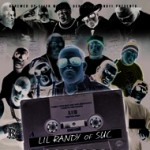Lil’ Randy, Helta Skelta

Everything Lil’ Randy touches turns psychedelic. This is true whether it’s a locally-commissioned R&B mixtape or freestyles by local luminaries who come to the DJ Screw protege for his take on his mentor’s Screwtape tradition. On his first all-rock’n’roll mixtape, Lil’ Randy gets to work quickly, deconstructing the sacred cows of 1990s guitar-rock smash hits.
First, Randy bleeds the pop out of Green Day‘s “Brain Stew,” repeating phrases from each verse, and he seems to enjoy dragging even more crunch out of the swirling grind of guitars. It’s a good song, one that many of us have heard so many times that it’s become white noise. But the playful humor, at this speed, turns sad. The couch potato in Armstrong’s story takes on more pitiful tone. His jokes become Freudian, and we see through his flippant humor to feel, perhaps for the first time, the pain of the otherwise clichéd slacker clown.
Randy seems looser and more at home with “Fly Away,” the easy-listening funk, come-try-our-airline commercial by Lenny Kravitz. The chops start early, and phrases are repeatedly spun back and cut more frequently than the rest of the songs on the record. The song structure appeals to his R&B background, as he seemed to anticipate changes, making decisions instinctively, not to mention resurrecting a song I’d long ago lost interest in.
Next, and I realize it’s not exactly rock’n’roll, Sarah MacLachlan moans “Building a Mystery” as if for the first time. Randy seems determined to keep out of the way of the poetry, finding the right pitch to slow the song to and maybe even becoming a little bit in awe of it. This song had, for me, long since become elevator music. Grocery store music, in fact, stripped of its power to mean anything ever again merely by having been piped into cold, institutional buildings for so many years, but Randy rests in the new groove he’s found for this muzak-ed smash hit.
Drums are brought to the forefront, and synthed handclaps bounce on the downbeat between a funk-bass note. The angelic singing is, of course, different here, not angelic singing at all, but instead carrying the sad weight of the lyrics, making clearer the bizarre imagery in the poetry and the serene wisdom of the singer.
The Red Hot Chili Peppers‘ “Under the Bridge” benefits massively from being slowed down. The song has always been too fast and too poppy for a song about heroin. Here, it’s a lament, to match the now-elevated lyrics. Randy seems to take the story personally, scratching freely, at times just a word, bringing it in early like a ghostly interloper and, at other times, letting tension build and release itself, showing an expert’s restraint.
This song came out 20 years ago, at a time when rock excess was rampant. There’s a choir which, rather than amplifying the intended effect, always seemed embarrassing to me. But at Randy’s half-speed pitch, after he’s built the drama, the choir sings the epitaph back to the narrator, all full of ghosts and drawing blood and meaning from his life story.
The sacred cow in this collection is Nirvana‘s “In Bloom,” chopped and Screwed for the very first time. Randy finds several places to experiment with effects, stretching the format of his genre as early as the opening verse. By the end of the first refrain of “he’s the one who likes all our pretty songs….,” Randy has seamlessly repeated nearly every word at one point or another, relishing the playful drumming with bold shows of confidence, never treating the song as too precious to apply his process.
Ariel Santschi said to me that at their first meeting, DJ Screw was listening to a vinyl 12″ of Nevermind. Ariel asked him, “Are you gonna put that on a tape?,” to which Screw answered, “Not until I get two copies of it.” I always wanted to hear what that would have sounded like. Now we know.
I’ve always thought of “Black Hole Sun” as my generation’s “Dark Side of the Moon.” Where Pink Floyd’s docile druids medidated languidly on the lunar landscape, Chris Cornell‘s agressive Viking snake-rider stares at the sun for hours and hours. And at Randy’s Screwed Up speed, the psychdelia swirls exponentially, as the the acid drenched ghost of Geezer Butler’s youth inhabits Cornell’s narrative, visiting him with visions of pagan ritual, the barbituated guitars’ thousand-note solos tell better the story. Just as, moments earlier, Cobain proclaimed their punk revolution “In Bloom,” the movement is mourned serendipitously under the blaze of the Black Hole Sun, and Randy’s half-timed double-dose of the inverted doom-metal ballad eulogizes Cobain’s revolution that almost was.
A mashup of “I’m on the Outside”, by Staind, and the Coldplay song “Trouble” closes out the mixtape by emphasizing what Randy, like Screw, does best. It combines all the elements of pitch control, instinctive cutting, scratching, and subtle mixing. As the songs bleed imperceptibly together, Randy sees what the two songs have in common and bridges them together with a fade and a dedication to lost friends, called by name. And if the record has a theme, this song defines it. It’s a mixtape of sentimental songs.
DJ Screw’s revolution, just as Kurt Cobain’s, was cut down in its prime. And just as Soundgarden, with “Black Hole Sun,” continued on their path to find the closest thing to an answer, to a reasoned understanding of the pain and the catharsis, so did Lil’ Randy of the Screwed Up Click with his mixtape Helta Skelta.
By continuing on, by applying the process and honoring the art form, we find meaning in the music that we can meditate on and apply to our own lives. That we can spare ourselves the pain. That among the Helter Skelter we can slow things down to a manageable pitch, and we can process the plots of our own “Screwed Up Life.”



Leave a Reply